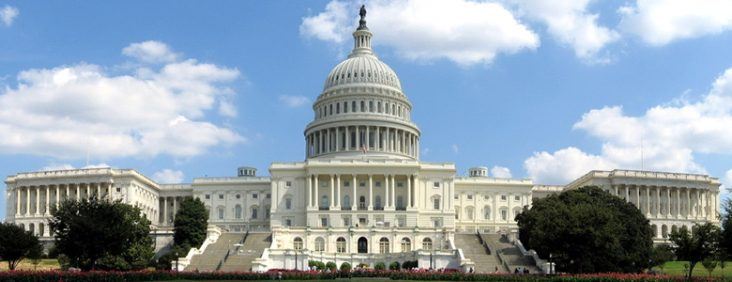Bill in Congress would overturn prohibition on churches, tax exempt organizations from participating in politics
by February 6, 2017 3:01 pm 903 views

U.S. Rep. Walter Jones Jr., R-North Carolina, has introduced a bill that would overturn the Johnson Amendment. The amendment prevents churches and other non-profit organizations from engaging in political activities, or they risk losing their tax-exempt status from the IRS.
President Donald Trump has said he supports the law’s removal, a key element in the separation of church and state, according to supporters.
Congressional briefings by organizations opposed to HR 172 were held this week. Jones told Talk Business & Politics exclusively he hopes his bill will be part of a tax overhaul package under consideration in Congress. He hand delivered a letter to Speaker of the House Paul Ryan, R-Wisc., encouraging him to move the legislation forward.
“We have people of faith across the country screaming for this … God will make it happen,” Jones said. “The stars are lining up. It doesn’t mean it will happen, but the stars are lining up.”
Other groups are preparing a rigorous defense of the amendment.
“We don’t want the government coming into a church a telling people what to believe … we also don’t want it the other way around,” American Humanist Association Legislative Director Mathew Bulger told Talk Business & Politics. “These organizations should be non-partisan.”
If the amendment is overturned, it could open a “floodgate” of non-taxable money into politicians’ coffers, Bulger said.
AHA is among the organizations opposed to the bill, and it participated in the briefings. The bill has been placed in the House Ways and Means Committee, but no action had been taken as of Wednesday. Jones argues in the bill it will “restore the free speech and First Amendment rights of churches and organizations.”
A local church in Jones’s district received a letter threatening its tax exempt status because of words spoken by the pastor. It spurred him to action, he said. Each session since 2001, Jones has tried to change the law with no luck. The IRS can’t monitor all churches, and relies on whistle blowers to expose possible violations. Jones said he’s only found one instance where a church lost its exempt status. Jones thinks it could be an issue that crosses many party lines if it ever comes to the full vote.
If the law is changed, those seeking to influence a candidate could do so by giving to a church with the understanding the money would end up with the candidate, Bulger said. Campaign finance laws require candidates to disclose most of their contributors and there are limits as to how much can be contributed, he said. Money funneled through churches would be untraceable and untaxed, giving those preferred candidates and organizations an unfair electoral advantage, he said.
Jones refuted that saying if a church or pastor gave money to a candidate it would still be under the country’s campaign finance laws. The bill isn’t about money; it’s about free speech, he said.
“Why should the government have the authority to dictate what’s in the heart, mouth, or brain of a preacher?” he said.
The Johnson Amendment was passed in 1954. It required churches and other non-profits with 501c3 tax statuses to refrain from political activities. The amendment is named for President Lyndon Johnson who introduced while he was in Congress. It was little discussed when passed, according to published reports.
Trump told supporters throughout his presidential campaign he planned to remove the Johnson Amendment if elected. He told a crowd in Iowa following his election win, it was still his intention. Political pundits have credited this stance and his promises to appoint judges who will overturn Roe v. Wade as a primary reason why Trump did so well with Evangelical voters. When Jones heard Trump intended to remove the law he became encouraged. He hasn’t spoken with the new president, but he plans to reach out to Vice-President Mike Pence, a former colleague.
There are some in the country, including parishioners, who do not want their churches to become political. A report released in September from the Nashville-based Southern Baptist Convention indicated that 79% of Americans don’t think pastors should endorse candidates during a church service and 75% don’t think a pastor should publicly endorse any candidate. More than 80% of those surveyed don’t think church monetary resources should be used to campaign for candidates.
Outspoken ordained Baptist minister and evangelist Tony Campolo once quipped “When government and church begin to mix, it’s like mixing ice cream with horse manure. You will not ruin the horse manure, but you will ruin the ice cream.”
Another consequence could be the parishioners themselves. A church could give money to a candidate without its constituents knowing. People in the church might think they’re giving money to specific causes, and in reality it’s being sent to political candidates, he said.
Besides the monetary component, there are other reasons to oppose HR 172, Bulger said. Pastors could tie religious dogmas with politics, and those ideas could filter into governance, meaning the separation of church and state will be violated. He admitted, however, that many parishioners are fully aware of their pastors’ political leanings despite the amendment.
Bulger isn’t sure if it will make it through committee. If it does, his organization, some religious organizations and others will vigorously try to stop it. He expects members from both parties to oppose its passage. Predictgov gives the bill a 2% chance of passage.
“We don’t need political endorsements being made directly or indirectly from the pulpit,” Bulger said.
